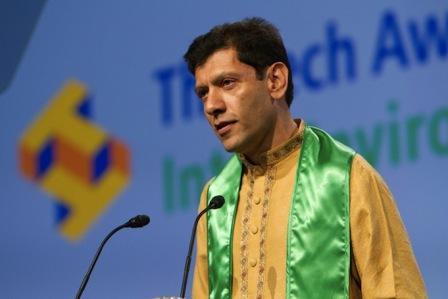/topics/contamination-pollution-and-quality
Contamination, Pollution and Quality
Ecological Sanitation locations in India
Posted on 01 Dec, 2010 04:55 PMEcological Sanitation is a new approaching sanitation where there is minimal water use and where human waste can be used as fertilizer. It is a truly sustainable approach.
Peer Water Exchange (PWX) receives 2010 Intel Environment Award
Posted on 29 Nov, 2010 04:40 PM
The Peer Water Exchange (PWX) was awarded the 2010 Intel Environment Award today. PWX, a project of Blue Planet Network, is a combination of process, technology platform, and people designed to unlock the global capacity and creativity of individuals, philanthropies, businesses and implementers to solve the global safe drinking water and sanitation crises.

Fluorosis water contamination in rural India - A video by Earth Report
Posted on 26 Nov, 2010 12:08 PMVideo Courtesy: EarthReport
Source: 5min Media
It has been proved that it's a direct result of drinking ground water that's contaminated with high levels of fluoride. This video suggests that rainwater is the best source of water for communities living in these regions.
Seasonal changes in Indian aerosols: Updates from Earth Observatory
Posted on 25 Nov, 2010 12:49 PMIn recent years, scientists have detected very high levels of aerosol pollution in the air over India. Some of it is the result of industrial and agricultural activity, and some of it is nature at work.
Water treatment - Extended user testing of water treatment devices in Andhra Pradesh - A research paper by PATH
Posted on 16 Nov, 2010 12:12 AMIn this research paper, PATH hopes to identify, adapt and develop water treatment devices and business models for water treatment devices for the ecnomically weaker sections of society.
Paving the way for the control of Cholera and Typhoid fever in Kolkata - A research project report of the NICED-IVI collaboration
Posted on 13 Nov, 2010 08:43 AMThis collaborative research work between National Institute of Cholera and Enteric Diseases (NICED), Kolkata and International Vaccine Institute (IVI), Seoul under the Diseases of the Most Impoverished (DOMI) Program, supported by the Bill and Melinda Gates Foundation aims to give useful information for the prevention and control of typhoid fever and cholera. The aim is to accelerate the introduction of new generation vaccines against cholera, shigellosis, and typhoid fever, through research and capacity-building.
The burden of cholera in the slums of Kolkata - A community based study by NICED
Posted on 12 Nov, 2010 12:29 AMThis paper by National Institute of Cholera and Enteric Diseases (NICED) is based on a prospective, community based study in an impoverished urban site in Kolkata in order to measure the burden of cholera, describe its epidemiology, and search for potential risk factors that could be addressed by public health strategies. The study population was enumerated at the beginning and end of the study period. Surveillance through five field outposts and two referral hospitals for acute, watery, non-bloody diarrhoea was conducted from May 2003 to April 2004.
Heavy rains, cyclones and floods affect the life of millions; News Roundup (1-7 November 2010)
Posted on 09 Nov, 2010 08:09 PMRecent news indicates extensive reports on the threat and destruction unleashed by cyclone Jal in the three states of Andhra Pradesh, Karnataka and Tamil Nadu, with the states of Andhra Pradesh and Karnataka being affected the most. Cyclone Jal has led to heavy rainfall in both these states leading to floods and a heavy death toll in the coastal districts of both the states, besides reports of destruction of agricultural produce in the state of Karnataka.
South India
Andhra Pradesh
- Administration on high alert with the threat of cyclone Jal approaching the Andhra Pradesh coastline
- Cyclone 'Jal' claims lives in Andhra Pradesh
- Cyclone 'Jal' claims five lives in Andhra Pradesh
- Cyclone threat in Andhra, rains kill 20
- Andhra rains cause havoc, death toll rises to 25
- Rain claims 4 lives in Vizag, 2 in East Godavari
- Rain fury continues in Andhra Pradesh's coastal districts
- Heavy rains wreak havoc in coastal Andhra Pradesh
News roundup (22 - 31 October 2010) :" India: Land of many cell phones, but fewer toilets"
Posted on 03 Nov, 2010 08:50 AMWastewater/Sanitation
"Gujarat farmers fight against climate change: Adopt technoloxxgy to conserve resources and maximize benefits" : News roundup (15-21 October 2010)
Posted on 22 Oct, 2010 11:25 AMClimate Change





